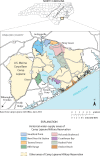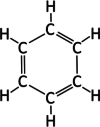Clinical encounter with three cancer patients affected by groundwater contamination at Camp Lejeune: a case series and review of the literature
- PMID: 35818079
- PMCID: PMC9275133
- DOI: 10.1186/s13256-022-03501-9
Clinical encounter with three cancer patients affected by groundwater contamination at Camp Lejeune: a case series and review of the literature
Abstract
Background: Advanced understanding of tumor biology has recently revealed the complexity of cancer genetics, intra/inter-tumor heterogeneity, and diverse mechanisms of resistance to cancer treatment. In turn, there has been a growing interest in cancer prevention and minimizing exposure to potential environmental carcinogens that surround us. In the 1980s, several chemical carcinogens, including perchloroethylene (PCE), trichloroethylene (TCE), and benzene, were detected in water systems supplying Camp Lejeune, a US Marine Corps Base Camp located in North Carolina.
Case presentation: This article presents three cases of cancer patients who have lived at Camp Lejeune, and, decades later, came to our clinic located 1000 miles from the original exposure site. The first patient is a young Caucasian man who was diagnosed with T cell acute lymphoblastic leukemia at the age of 37, and the second patient is a Caucasian man who had multiple types of cancer in the prostate, lung, and colon as well as chronic lymphocytic leukemia in his 60s and 70s. The third patient is another Caucasian man who had recurrent skin cancers of different histology, namely basal cell carcinomas, squamous cell carcinomas, and melanoma, from his 50s to 70s.
Conclusions: The US Congress passed the Honoring America's Veterans and Caring for Camp Lejeune Families Act in 2012, which covers appropriate medical care for the people affected by the contamination. We hope that this article raises awareness about the history of Camp Lejeune's water contamination among cancer care providers, so the affected patients can receive appropriate medical coverage and cancer screening across the country.
Keywords: Benzene; Chemical carcinogen; Perchloroethylene (PCE); Trichloroethylene (TCE).
© 2022. The Author(s).
Conflict of interest statement
The authors report no conflict of interest in this work.
Figures



References
-
- The official website of the United States Marine Corps. https://www.lejeune.marines.mil/visitors/history.aspx. Accessed 31 Jan 2022.
-
- Faye RE, Green JW Jr. Analyses of groundwater flow, contaminant fate and transport, and distribution of drinking water at Tarawa Terrace and vicinity, U.S. Marine Corps Base Camp Lejeune, North Carolina: historical reconstruction and present-day conditions—chapter e: occurrence of contaminants in groundwater. Atlanta: Agency for Toxic Substances and Disease Registry; 2007.
-
- Shiver R. A groundwater investigation to define the source(s) of tetrachloroethylene that have contaminated three community water supply wells at Tarawa terrace I, Camp Lejeune marine corps base, Onslow County. North Carolina Department of Natural Resources and Community Development. 1958.
-
- Duffus JD, Hopf JF, Kane TR. Deposition of Victor John Melts. Written communication. April 12, 2001. http://tftptf.com/images/VJ_MELTS_12Apr2001.pdf. Accessed 28 Jun 2022.
-
- National Research Council (US) Committee on contaminated drinking water at Camp Lejeune. Contaminated water supplies at Camp Lejeune: assessing potential health effects. Washington, DC: National Academies Press (US); 2009. - PubMed
Publication types
MeSH terms
Substances
LinkOut - more resources
Full Text Sources
Medical

